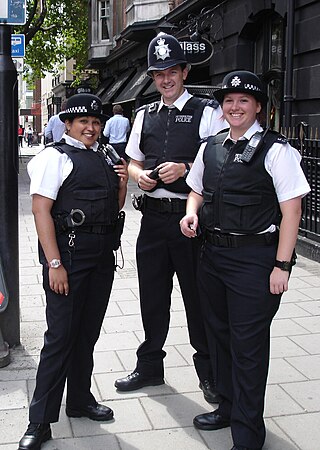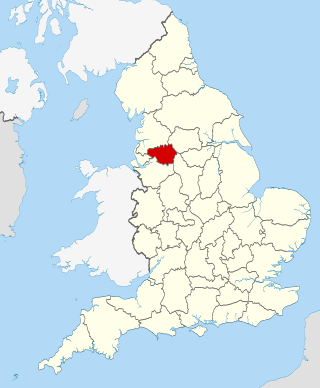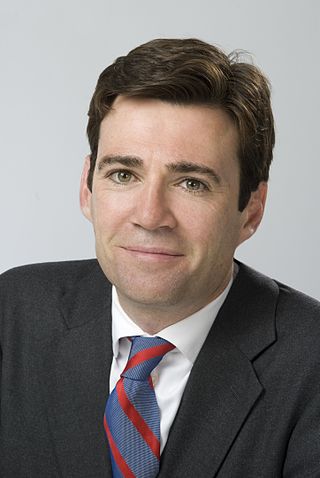
The Greater London Authority (GLA), colloquially known by the metonym City Hall, is the devolved regional governance body of Greater London, England. It consists of two political branches: the executive Mayoralty and the 25-member London Assembly, which serves as a means of checks and balances on the former. Since May 2016, both branches have been under the control of the London Labour Party. The authority was established in 2000, following a local referendum, and derives most of its powers from the Greater London Authority Act 1999 and the Greater London Authority Act 2007.

The Metropolitan Police Service (MPS), formerly and still commonly referred to as the Metropolitan Police, is the territorial police force responsible for law enforcement and the prevention of crime within the ceremonial county of Greater London. In addition, it is responsible for some specialised matters throughout the United Kingdom, including national counter-terrorism measures and the protection of specific people, such as the monarch and other members of the royal family, members of the government, and other officials.

Law enforcement in the United Kingdom is organised separately in each of the legal systems of the United Kingdom: England and Wales, Scotland, and Northern Ireland. Most law enforcement duties are carried out by those who hold the office of police constable of a territorial police force.

Local government in England broadly consists of three layers: civil parishes, local authorities, and regional authorities. Every part of England is governed by at least one local authority, but parish councils and regional authorities do not exist everywhere. In addition, there are 31 police and crime commissioners, four police, fire and crime commissioners, and ten national park authorities with local government responsibilities. Local government is not standardised across the country, with the last comprehensive reform taking place in 1974.

The Commissioner of Police of the Metropolis is the head of London's Metropolitan Police Service. Sir Mark Rowley was appointed to the post on 8 July 2022 after Dame Cressida Dick announced her resignation in February 2022.
A police authority in the United Kingdom is a public authority that is responsible for overseeing the operations of a police force. The nature and composition of police authorities has varied over time, and there are now just four dedicated "police authorities" in the United Kingdom, although the term can refer to various similar successor bodies.
Chief constable is the rank used by the chief police officer of every territorial police force in the United Kingdom except for the City of London Police and the Metropolitan Police, as well as the chief officers of the three 'special' national police forces, the British Transport Police, Ministry of Defence Police, and Civil Nuclear Constabulary. The title is also held by the chief officers of the principal Crown Dependency police forces and the Sovereign Base Areas Police in Cyprus. The title was also held, ex officio, by the president of the Association of Chief Police Officers under the Police Reform Act 2002. It was also the title of the chief officer of the Royal Parks Constabulary until this agency was disbanded in 2004.
A chief of police (COP) is the title given to an appointed official or an elected one in the chain of command of a police department, particularly in North America. A chief of police may also be known as a police chief or sometimes just a chief, while some countries favour other titles such as commissioner or chief constable. A police chief is appointed by and answerable to a state or local government.
Police commissioner is a senior rank in many police forces of the world. In other jurisdictions, it is the title of a member of an oversight board.
The Metropolitan Police Authority (MPA) (2000–2012) was the local police authority responsible for scrutinising and supporting the work of the Metropolitan Police Service, the police force for Greater London. The establishment of the MPA in 2000 marked a fundamental change in the policing of London; establishing, for the first time, a local police authority for the metropolis, with the aim of ensuring that the Metropolitan Police Service was democratically accountable.

The Independent Police Complaints Commission (IPCC) was a non-departmental public body in England and Wales responsible for overseeing the system for handling complaints made against police forces in England and Wales.

The Metropolitan Police of Greater London, England is organised into four main directorates, each headed by an Assistant Commissioner, and four civilian-staffed support departments previously under the umbrella of Met Headquarters, each headed by a Chief Officer, the equivalent civilian grade to Assistant Commissioner. Each business groups or directorate has differing responsibilities. The commands are Frontline Policing, Met Operations, Specialist Operations and Professionalism.

The Greater Manchester Combined Authority (GMCA) is a combined authority for Greater Manchester, England. It was established on 1 April 2011 and consists of 11 members; 10 indirectly elected members, each a directly elected councillor from one of the ten metropolitan boroughs that comprise Greater Manchester, together with the directly elected Mayor of Greater Manchester. The authority derives most of its powers from the Local Government Act 2000 and Local Democracy, Economic Development and Construction Act 2009, and replaced a range of single-purpose joint boards and quangos to provide a formal administrative authority for Greater Manchester for the first time since the abolition of Greater Manchester County Council in 1986.

Lewisham London Borough Council is the local authority for the London Borough of Lewisham in Greater London, England. It is a London borough council, one of 32 in the United Kingdom capital of London. The council is unusual in that its executive function is controlled by a directly elected mayor of Lewisham, currently Damien Egan. Lewisham is divided into 19 wards, each electing two or three councillors. There are currently 16 three member wards and 3 two member wards. Following the May 2018 election, Lewisham London Borough Council comprises 54 Labour Party councillors. The council was created by the London Government Act 1963 and replaced two local authorities: Deptford Metropolitan Borough Council and Lewisham Metropolitan Borough Council.

A police and crime commissioner is an elected official in England and Wales responsible for generally overseeing police forces. A police, fire and crime commissioner (PFCC) is an elected official in England responsible for generally overseeing both police forces and fire services. Commissioners replaced now-abolished police authorities. The first incumbents were elected on 15 November 2012.

The Mayor of Greater Manchester is the directly elected metro mayor of Greater Manchester, responsible for strategic governance in the region that includes health, transport, housing, strategic planning, waste management, policing, the Greater Manchester Fire and Rescue Service and skills. The creation of the Mayor of Greater Manchester was agreed between the then Chancellor of the Exchequer, George Osborne, and Greater Manchester's 10 district council leaders. As well as having specific powers, the mayor chairs the Greater Manchester Combined Authority, also assuming the powers of the Greater Manchester Police and Crime Commissioner.

The Mayor of West Yorkshire is a directly elected mayor responsible for the metropolitan county of West Yorkshire in England. The Mayor chairs and leads the West Yorkshire Combined Authority, and assumes the office and powers of the West Yorkshire Police and Crime Commissioner.
The current Deputy Mayor of London for Policing and Crime is Sophie Linden. The office holder is head of the Mayor's Office for Policing and Crime.
The home secretary is one of the most senior and influential ministers in the UK Government, and the holder of a Great Office of State. The home secretary's remit includes law enforcement in England and Wales, matters of national security, issues concerning immigration, and oversight of the Security Service (MI5).











